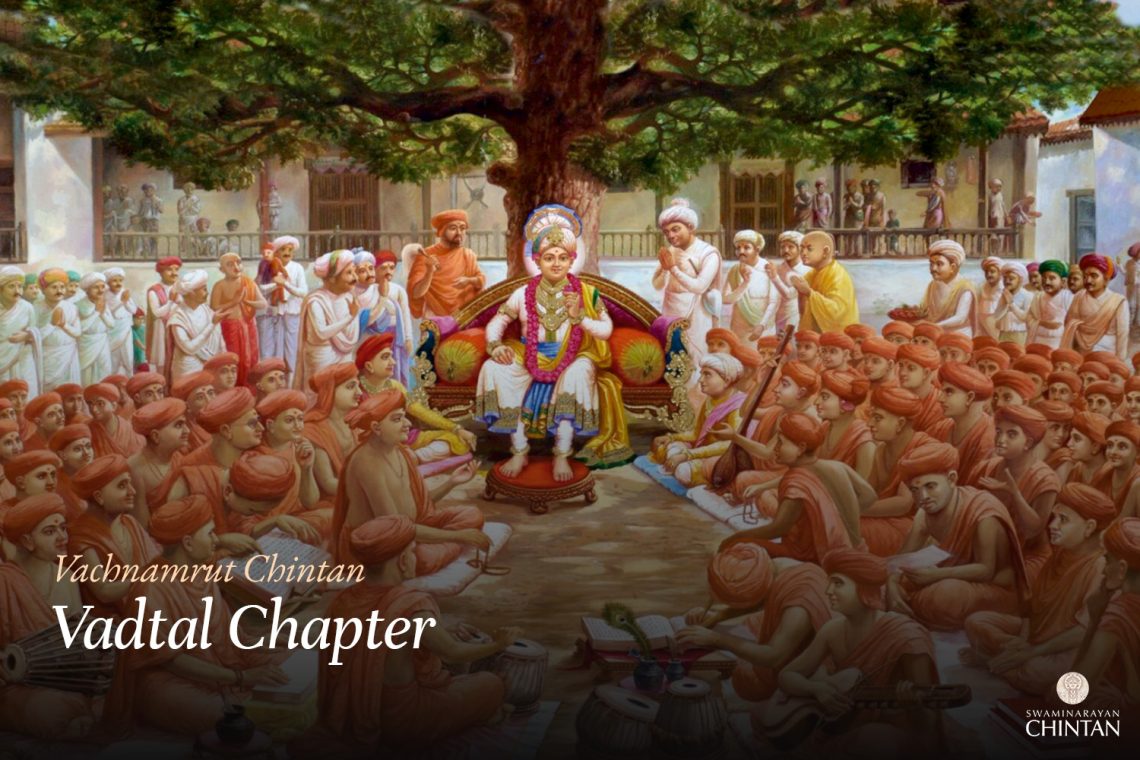Central Insights:
- The extent of power held by kaal (time) and karma (deeds).
Key Points:
- The ultimate authority lies with Paramatma (Supreme God).
- Kaal and karma deliver results only through Bhagwan’s will.
- Bhagwan grants each soul a body based on its past karma, so the variations in the soul’s experiences are outcomes of its deeds, not due to any partiality or harshness on Bhagwan’s part.
Explanation:
In this Vachanamrut, Chimnaraavji of Vadodara posed a question. “Maharaj, at the time of the first pralaykaal (final dissolution), souls merged into maya while in a karan sharir (causal body). Later, during the period of creation, these souls obtained sthul (gross) and sukshma (subtle) bodies, manifesting as deities, humans, and others in diverse forms. Was this diversity a result of karma or Bhagwan’s will? If it is attributed to karma, this aligns with Jain philosophy; if to Bhagwan’s will, it suggests unfairness or harshness in Bhagwan Himself. Therefore, please explain as it truly is.”
Maharaj replied, “Your question does not capture the matter precisely. The karan sharir contains the sthul and sukshma bodies as a seed contains a tree, which is why it is called the karan sharir. The karan sharir is avaidyaatmika (stemming from ignorance), meaning it creates inverted understanding contrary to reality, perceiving suffering as pleasure, pleasure as suffering, the body as the self, and fostering a sense of possessiveness toward harmful things. It is therefore avaidyaatmika and also anaadi (beginningless) in origin, which means it didn’t emerge at any point to later attach itself to the soul; it has existed alongside the soul since the beginning. However, it is not anant (endless); it ceases to exist in the state of mukti (liberation). Thus, it is anaadi but finite. Sanchit karma (accumulated deeds) are contained within the karan sharir, forming an inseparable bond with the soul, just as scent is bound with earth. This is an anaadi sambandh (beginningless relationship) that is, however, not endless, as it can eventually be removed.
In another Vachanamrut, Maharaj provided a beautiful analogy: Paramatma is like rain-bearing clouds, the souls are like seeds, and maya is like the earth. Just as rain causes the seeds within the earth to sprout according to their nature, resulting in diverse trees like thorny acacias and mango trees, the rainwater itself is neutral, and diversity exists within the seeds due to their own sanchit karma. Similarly, Paramatma endows souls with bodies based on their deeds, without any biased perspective of His own.
An atheist, disregarding Paramatma, falsely claims that karma alone is the primary force. If rain (representing divine influence) were absent, even the finest seed would yield no results. If karma were truly supreme, results should occur without any association with rain, but they do not. Therefore, it is incorrect to regard karma alone as the truth.
In the scriptures, references to the power of karma generally refer to actions performed in devotion to Paramatma, especially in the case of His ekantik (steadfast) devotees. The concept of “the power of time” (kaal) applies in specific instances, such as in wars or accidental events, but it does not universally dominate all situations. The same understanding applies to swabhav (innate tendencies). When Bhagwan manifests on earth, His own will prevails, as exemplified when He incarnates with the resolve to offer grace to all, whether devotees or non-devotees. Hence, only Paramatma’s power is at work in such moments, not that of kaal or karma.
For example, during the Krishna avatar, Putna, who came to poison Bhagwan, was granted liberation, as was Yashoda, and other demons who sought to harm Bhagwan. Similarly, Shreeji Maharaj has redeemed even souls with mountainous sins through His divine grace. In such instances, only the power of Paramatma is at play. Ultimately, kaal and all other forces derive their strength from Paramatma’s will and can only act accordingly. Without His consent, even a blade of grass cannot move. Thus, only Paramatma holds supreme authority.
If Bhagwan were to directly assume full responsibility for everything without delegating any role to kaal, karma, or maya, His creation would lose purpose, and all responsibility would fall solely upon Him. Therefore, He operates through these forces by His own will, reflecting His divine sovereignty.
Glossary
| Kaal – Time Refers to the universal law of time that governs the cycles of creation, destruction, and events in the world. Kaal is seen as subordinate to Bhagwan’s will, not independent. |
| Karma – Action The deeds performed by a Jeev, which determine its future experiences based on the law of cause and effect. |
| Paramatma – Supreme God God, the all-pervading and ultimate reality. |
| Karan Sharir – Causal body |
| Sanchit Karma – Accumulated deeds The stored actions from past lives, which influence the soul’s current condition and experiences. These deeds are carried with the soul until they are resolved. |
| Avaidyaatmika – Rooted in ignorance Describes the karan sharir’s tendency to cause deluded understanding, such as mistaking the body for the self. |
| Anaadi – Beginningless Refers to something that has no starting point in time, such as the karan sharir, which exists with the soul from the beginning of time and continues until liberation. |
| Maya – Illusion The material energy that entangles the Jeev in worldly existence and distracts from Bhagwan. |
| Ekantik Bhakta – Single-minded devotee A devotee imbued with Dharma, Gyan, Vairagya, and Bhakti, fully dedicated to God. |
| Swabhav – Nature |
| Pralaykaal – Time of final dissolution |

